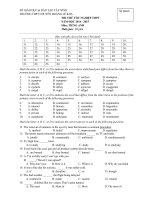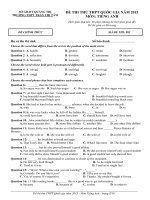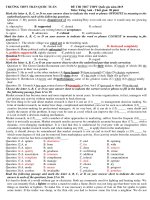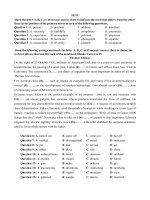- Trang chủ >>
- THPT Quốc Gia >>
- Ngoại Ngữ
Đề thi thử THPT Quốc gia môn Tiếng Anh năm 2015
Bạn đang xem bản rút gọn của tài liệu. Xem và tải ngay bản đầy đủ của tài liệu tại đây (104.34 KB, 8 trang )
TEST
Mark
the
letter
A, B, C, or D on
your answer sheet
to
indicate
the
word that differs from
the
other
three
in the
position
of the
primary stress
in
each
of the
following
questions.
Question
1: A. pursue B. promote C. address D. mandate
Question 2: A. sincerely B. faithfully C. completely D. extremely
Question 3: A. experience B. atmosphere C. political D. physician
Question 4: A. recommend B. hurricane C. photograph D. separate
Question 5: A. miraculous B. diversity C. platoon D. occupation
Read
the
following passage
and
mark
the
letter
A, B, C, or D on
your answer sheet
to
choose
the
word
or
phrase that best
fits
each
of the
numbered
blanks
from
6 to 15.
Thomas Edison
On the night of 21 October 1931, millions of Americans took part in a coast-to-coast ceremony to
commemorate the passing of a great man. Lights (6) in homes and offices from New York to
California. The ceremony (7) the death of arguably the most important inventor of all time:
Thomas Alva Edison.
Few inventors have (8) such an impact on everyday life, and many of his inventions played a
crucial (9) in the development of modern technology. One should never (10) how
revolutionary some of Edison’s inventions were.
In many ways, Edison is the perfect example of an inventor - that is, not just someone who
(11) up clever gadgets, but someone whose products transform the lives of millions. He
possessed the key characteristics that an inventor needs to (12) a success of inventions, notably
sheer determination. Edison famously tried thousands of materials while working on a new type of
battery, reacting to failure by cheerfully (13) to his colleagues: ‘Well, at least we know 8,000
things that don’t work’. Knowing when to take no (14) of experts is also important. Edison’s
proposal for electric lighting circuitry was (15) with total disbelief by eminent scientists,
until he lit up whole streets with his lights.
Question
6: A turned out
Question
7: A marked
Question
8: A put
Question
9: A effect
Question
10: A underestimate
Question
11: A creates
Question
12: A gain
Question
13: A announcing
Question
14: A notice
Question
15: A gathered
B came off
B distinguished
B had
B place
B lower
B shapes
B make
B informing
B regard
B caught
C went out
C noted
C served
C role
C decrease
C dreams
C achieve
C instructing
C attention
C drawn
D put off
D indicated
D set
D share
D mislead
D forms
D get
D notifying
D view
D received
Mark the letter A, B, C, or D on your answer sheet to indicate the word(s) CLOSEST in
meaning to the underlined word(s) in each of the following questions.
16. They had to refuse the dinner invitation because of a prior engagement.
A. successful B. later C. earlier D. important
17. I knew he was only flattering me because he wanted to borrow some money.
A. teasing B. praising C. threatening D. elevating
18. I’m a bit wary of giving people my address when I don’t know them very well.
A. cautious B. upset C. willing D. capable
Mark the letter A, B, C, or D on your answer sheet to indicate the word(s) OPPOSITE in
meaning to the underlined word(s) in each of the following questions.
19. We left New York when I was six, so my recollections of it are rather faint.
A. explicable B. unintelligible C. clear D. ambiguous
20. My first impression of her was her impassive face
A. emotional B. respectful C. solid D. fractious
21. She wrote me a vicious letter.
A. helpful B. gently C. dangerous D. healthy
Mark
the
letter
A, B, C, or D on
your answer sheet
to
indicate
the
correct answer
in
each
of
the
following
questions.
Question 22: Our last hopes would all probability evaporate
A. on B. in C. of D. for
Question 23: ________ at his lessons, still he couldn’t catch up with his classmates.
A. Hardly as he worked B. Hard as he worked
C. Hard as he does D. Hard as he was
Question24: …………… the storm, the ship couldn’t reach its destination on time.
A. In case of B. But for C. Because of D. In spite of
Question 25: My cat would not have bitten the toy fish…………it was made of rubber.
A. if she has known B. if she should know
C. had she known D. if she knew
Question 26: A washing machine of this type will certainly………….normal domestic use.
A. stand up for B. come up with C. get on to D. take down with
Question 27: He had changed so much since the last time we met that I ___________him.
A. could recognize B. could hardy recognize
C. wouldn't have recognized D. don't recognize
Question 28: Don’t pick ________ me just because you want someone you can blame
A. on B. at C. out D. up
Question 29: The road in front of my house needs ………
A. repairing B. be repaired C. to repair D. of repairing
Question 30: She should ___________ in the garage when we came around, which would explain
why she didn't hear the bell.
A. work B. be working C. have worked D. have been working
Question 31: We would contact your nearest relative ______ any accident occurring.
A. in place of B. in spite of C. on account of D. in the event of
Question 32: Tom: Is your government salary good?
Mary: Yes, but I don’t make as much _______worked in private industry.
A. as I would if I B. if I would have C. I would if D. as I
Question 33: “A motorbike knocked Ted down". - ' '
A. What is it now? B. What a motorbike! C. How terrific! D. Poor Ted!
Question 34: Delegates will meet with _______from industry and the government.
A. represented B. representative
C. representatives D. representers
Question 35: She was ………………she could not say anything.
A. so surprised at the news that B. such surprised at the news that
B. so surprised of the news that D. so that surprised for the news
Question 36: No sooner ……………….at the bus stop ………… the bus came.
A. he had arrived/when C. had he arrived / than
B. had he arrived/ when D. he had arrived / than
Question 37: The replacement of shops such as the groceries’ and chemist’s by cafes………… the
housewives with insufficient facilities for shopping.
A. leave B. have left C. has left D. to have left
Question 38: Anne was not ___________ to think that the test was too difficult.
A. who B. the one who C. the only one D. among the people
Question 39: Please don’t ……………it amiss if I make a few suggestions for improvement.
A. think B. judge C. take D. assume
Question 40: He ……………… off alone a month ago and …………… of since.
A. set/ hasn’t been heard B. setted/ hasn’t heard
C. set/hasn’t heard D. setted/ hadn’t been heard
Question 41: - What do you want to do this summer?
- I think we should go somewhere ________ has plenty of sun and sand.
A. who B. where C. when D. that
Question 42: If coastal erosion continues to take place at the present rate, in another fifty years this
beach ______.
A. won’t be existing B. doesn’t exist C. isn’t going to exist D. isn’t existing
Question 43: Not only John but his brothers ______ also in debt.
A. have B. were C. was D. is
Question 44: We don't allow in the classroom.
A. people smoke B. smoke C. people to smoke D. to smoking
Question 45: – Did your brother go to France?
- No, our parents suggested that we ________ there at night.
A. not go B. not going C. not to go D. won’t go
Read
the
following passage
and
mark
the
letter
A, B, C, or D on
your answer sheet
to
indicate
the
correct answer
to
each
of the
questions from
46 to 55.
No educational medium better serves as a means of spatial communication than the atlas. Atlases
deal with such invaluable information as population distribution and density. One of the best, Penny
Cooke’s World Atlas, has been widely accepted as a standard owing to the quality of its maps and
photographs, which not only show various settlements but also portray them in a variety of scales.
In fact, the very first map in the atlas is a cleverly designed population cartogram that projects the
size of each country if geographical size were proportional to population. Following the
proportional layout, a sequence of smaller maps shows the world's population density, each
country's birth and death rates, population increase or decrease, industrialization, urbanization,
gross national product in term of per capita income, the quality of medical care, literacy, and
language. To give readers a perspective on how their own country fits in with the global view,
additional projections depict the world's patterns in nutrition, calorie and protein consumption,
health care, number of physicians per unit of population, and life expectancy by region. Population
density maps on a sub-continental scale, as well as political maps, convey the diverse demographic
phenomena of the world in a broad array of scales.
Question 46: What is the main topic of this passage?
A. The educational benefits of atlases
B. Physical maps in an atlas
C. The ideal in the making of atlases
D. Partial maps and their uses
Question 47: According to the passage, the first map in Pennycooke's World Atlas shows
A. the population policy in each country
B. the hypothetical sizes of each country
C. geographical proportions of each country
D. national boundaries relative to population
Question 48: Which of the following sentences is TRUE about the atlas?
A. A country's population growth is presented clearly in the very first map in the atlas.
B. The atlas isn't as good as other educational medium in term of spatial communication.
C. The atlas provides readers with not only each country's life expectancy by religion but also its
language and literacy.
D. The atlas deals with such worthless information as population distribution and density.
Question 49: The word cleverly in the passage is closest in meaning to
A. clearly B. immaculately C. intelligently D. accurately
Question 50: Which of the following is NOT mentioned in the passage?
A. Calorie consumption B. Currency exchange rates
C. A level of educations D. Population decline
Question 51: The word layout in the passage refers to
A. the cartogram B. the geographical size
C. population D. each country
Question 52: The phrase in term of used in the passage is closest in meaning to
A. for considering aspects B. in spite of
C. with a view to D. in regard to
Question 53: It can be inferred from the passage that maps can be used to
A. pinpoint ethnic strife in each country
B. identify a shortage of qualified labor
C. give readers a new perspective in their own country
D. show readers photographs in a new form
Question 54: The author of the passage implies that
A. atlases provide a bird's eye view of countries
B. maps use a variety of scales in each projection
C. maps of countries differ in size
D. atlases can be a versatile instrument
Question 55: The word convey in the passage is closest meaning to
A. devise B. conjure up C. demonstrate D. indicate
Read
the
following passage
and
mark
the
letter
A, B, C, or D on
your answer sheet
to
indicate
the
correct answer
to
each
of the
questions from
56 to 65.
The fertile valleys of the river Nile straddle the hot desert land of Egypt. Rain is relatively
scarce, and the summers are scorching hot. Nevertheless the strip of land, known as the Cultivation,
on either side of the Nile is reputed to be one of the most fertile places in the world. Its rich black
soil is the result of accumulation of silt deposited by the annual flooding of the Nile thousands of
years ago. From June to October, the river overflowed its banks. Modern damps were then
constructed to control the flooding. The floodwaters left behind a rich sticky black mud which made
it suitable for the cultivation of crops. As long as the soil was well irrigated, two or three crops
could be grown in one season.
Its rich soil led to the growth and rise of the brilliant civilization of the ancient Egyptians on the
Nile valley more than 5000 years ago. The earliest Egyptians had acquired the skills to till the land
along the banks, drawing along the Nile became wealthy, they embarked on projects of digging
ditches and constructing dams to control the floods.
In about 3100 BC, the whole Egypt was united under the reign of King Menes. He and his
descendants made up Egypt's first ruling family, or dynasty. His rule led to the great development
of the arts like writing, painting, architecture, and crafts. Egyptian power and influence were to last
for the next 2000 years. The Egyptian kings had absolute powers. The king possesses all the land,
and the peasants had to surrender part of their crops to the king. An army of officials and scribes did
the task of collecting the exact amount of due from the individual farmers. Crops and livestock were
often seen at the storehouses surrounding the royal palaces. In return for their uphill task, the king
paid his officials and dishes out funds for huge irrigation projects.
Egypt's trade with the outside world stretches far and wide. In return for gold, copper,
gemstones, and building stones, it purchases the goods that it did not have. Timber, resins, oils,
silver and slaves came from Lebanon. From Deria and Anatolia came horses, while the blue stone
called lapis lazuli was imported from Mesopotamia. Strong forts were constructed to protect
overland trade routes. Egypt held Nubia in the south for almost 800 years. It served as Egypt's most
vital source of gold and slaves.
Question 56: The civilization of the ancient Egyptians was brought about by _____.
A. Egypt's first ruling family
B. the rich alluvial soil of the Nile
C. Egypt's trade with the outside world
D. the highly-developed writing, painting, architecture and crafts
Question 57: Egyptian slaves came from _____.
A. Syria and Anatolia B. Palestine C. Mesopotamia D. Lebanon
Question 58: The king was wealthy because _____.
A. he possessed all the land B. huge irrigation projects were set up
C. he was in absolute power D. farmers paid him their tribute
Question 59: The writer said that the annual flooding of the Nile _____.
A. needed to be controlled B. led to the discovery of new mines
C. caused an influx of foreign traders D. helped to develop the arts
Question 60: According to the passage, the king was wise _____.
A. to own slaves and gold
B. to pay for huge irrigation projects
C. to control the land
D. to import the things that Egypt did not have
Question 61: In return for, in the first line, last paragraph, refers to _____.
A. what Egypt exported
B. how fast the profit came
C. the respect Egypt received
D. the protection the Egyptian army provided
Question 62: A suitable title for this passage is _____.
A. The Farming Methods of the Egyptians B. The Landscape of the Egypt
C. The Might of the Egyptian Army D. The Civilization of the Ancient Egyptians
Question 63: We know the Egyptian Empire was powerful from the _____.
A. long period it extended its power and influence
B. way its army fought with other invaders
C. number of crops grown in one season
D. trade and business done with other nations
Question 64: Farm crops would be _____ if there was no water for irrigation.
A. harvested B. unavailable C. unprotected D. destroyed
Question 65: From June to October, the flood plains would be _____.
A. open to the building of new B. left to the sowing of new crops dams
C. raised to a higher level D. inundated with floodwaters from the Nile
Mark
the
letter
A, B, C, or D on
your answer sheet
to
indicate
the
underlined part that
needs
correction
in
each
of the
following
questions.
Question 66: For thousands of years, man has created sweet-smelling substances from wood,
A B
herbs, and flowers and using them for perfume or medicine.
C D
Question 67: No longer satisfied with the emphasis of the Denishawn School, Martha has
A B C
moved to the staff of the East school in 1925.
D
Question 68: What we know about certain diseases are still not sufficient to prevent them
A B
from spreading easily among the population.
C D
Question 69: When the changes of the electric charge on a cloud becomes strong enough,
A B
lightning flashes within the cloud.
C D
Question 70: Computers have made access to information instantly available just by push a few
buttons.
A B C D
Mark
the
letter
A, B, C, or D on
your answer sheet
to
indicate
the
sentence that
is
closest
in
meaning
to the
sentence given
in
each
of the
following
questions.
Question 71: It appears that the harvest workers think they were maltreated.
A. The harvest workers claim to have been maltreated.
B. The harvest workers claim to be maltreated.
C. The harvest workers claimed to have been maltreated.
D. The harvest workers are thought to have been maltreated.
Question 72: Fiona goes to the theater once in a blue moon.
A. Fiona goes to the theater when the blue moon is on.
B. Fiona goes to the theater only once a month.
C. Fiona goes to the theater when the moon is full.
D. Fiona rarely goes to the theater.
Question 73: He said, “Jane, I will show you round my city when you are here “
A. He made a trip round his city with Jane.
B. He promised to show Jane round his city.
C. He planned to show Jane round his city.
D. He organized a trip round his city for Jane.
Question 74: The meeting was put off because of pressure of time.
A. The meeting started earlier because people wanted to leave early.
B. The meeting was planned to start late because of time pressure.
C. The meeting lasted much longer than usual.
D. There was not enough time to hold the meeting.
Question 75: I remember telling you about the due day of the exam paper.
A.I remember to tell you when the exam paper was due.
B.I think I have told you about the exam paper's due.
C.I think I have told you when you sit for the exam.
D.I remember I have told you when the exam paper is due.
Question 76: It is widely believed that hard work makes success.
A. Many people believe that if you want to succeed, you should work hard.
B. People think that success is when you work hard.
C. Believers of success think that we should work hard.
D. Many people think that success at work is hard.
Question 77: It is my opinion that there is no advantage in further discussion.
A. Further discussion is not to my advantage.
B. I see no point in further discussion.
C. I think we need further discussion of advantage.
D. I think further discussion needs to be advantaged.
Question 78: Jim is my best friend. I borrowed his car yesterday.
A. Jim, whose car I lent yesterday, is my best friend.
B. Jim, whose car I borrowed yesterday, is my best friend.
C. Jim, who is my best friend, borrowed my car yesterday.
D. Jim, his car I borrowed yesterday, is my best friend.
Question 79: If it hadn’t been for his carelessness, we would have finished the work.
A. He was careless because he hadn’t finished the work.
B. If her were careful, we would finish the work.
C. If he had been more careful, we would have completed the work.
D. Because he wasn’t careless, we didn’t finish the work.
Question 80: By being absent so often, Paul failed the examination.
A. Paul's frequent absences cost him his chance of passing the examination.
B. Being absent so often caused Paul fail his examination.
C. Paul failed his examination although he was absent quite often.
D. Paul's failure in his examination accounted for his frequent absences.
THE END









